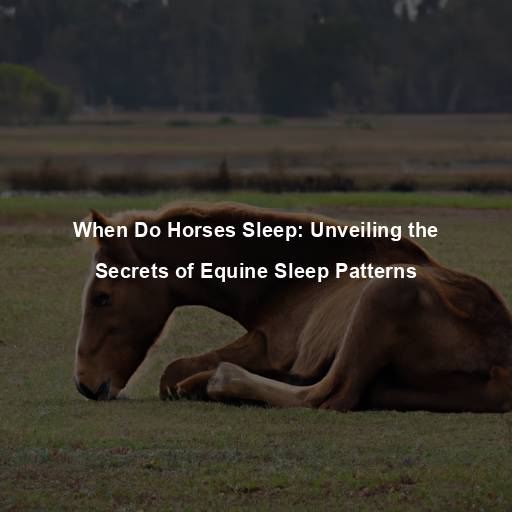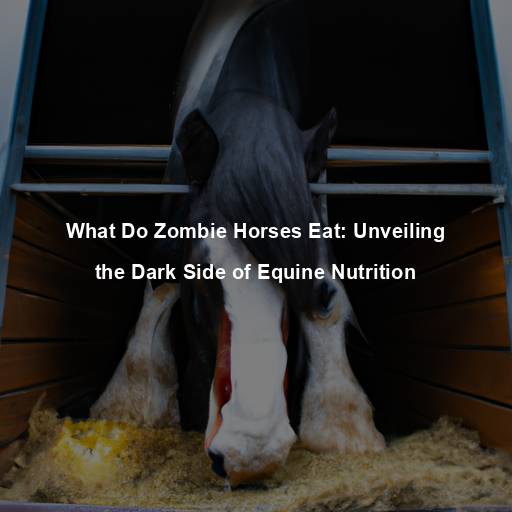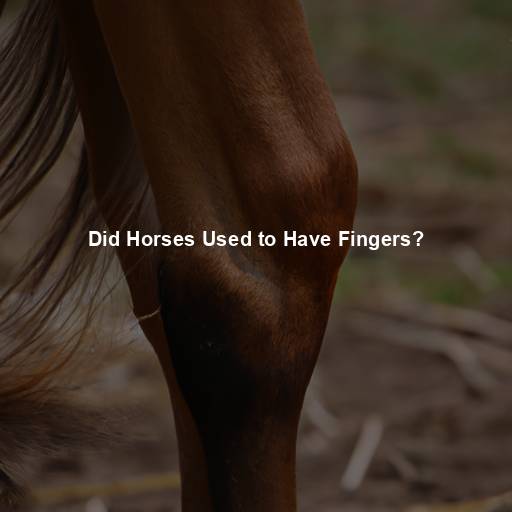When Do Horses Sleep: Unveiling the Secrets of Equine Sleep Patterns
Last Updated on October 26, 2023 by Evan
Horses, majestic creatures known for their grace and power, have captured the hearts of humans for centuries. As equestrian enthusiasts, we marvel at their beauty and admire their strength. But have you ever wondered when horses sleep? Do they sleep standing up like we often see in movies and books?
Contents [hide]
- 1 ## The Mystery of Equine Sleep
- 2 ## Unveiling the Sleep-Wake Cycle
- 3 ## Factors Affecting Equine Sleep
- 4 ## The Fascinating World of Equine Sleep
- 5 ## Ensuring Optimal Sleep for Horses
- 6 ## Appreciating the Wonders of Equine Sleep
- 7 FAQs – When do horses sleep?
- 7.1 When do horses sleep?
- 7.2 How long do horses sleep?
- 7.3 Do horses sleep at night or during the day?
- 7.4 Can horses sleep while standing up?
- 7.5 Do horses sleep lying down?
- 7.6 Do horses need a certain amount of sleep?
- 7.7 Are there any signs to indicate that a horse is sleeping?
- 7.8 Can horses have sleep disorders?
- 7.9 How can horse owners ensure their horses get enough sleep?
## The Mystery of Equine Sleep
In the world of equine sleep, the rules are far from conventional. Horses, the astute prey animals that they are, have developed intriguing sleep patterns that keep them on the edge of alertness. While human beings find solace in a peaceful slumber, these magnificent creatures must embrace a different approach. With the innate ability to doze off both while standing tall and nestled on the ground, horses adapt and mold their sleep routines to their ever-changing surroundings.
### Standing Sleep: A Safety Mechanism
There’s something truly captivating about the way horses catch their z’s. It’s like they have their own secret sleep trick up their hooves that keeps them comfortably standing upright. Known as the “stay apparatus,” this fascinating adaptation lets them lock their legs into place, allowing them to doze off while staying on their feet. It’s a brilliant survival strategy in the wild, where horses must always stay alert for any potential threats lurking nearby.
### REM Sleep: The Paradoxical Sleep
Have you ever wondered what goes on in a horse’s mind while they snooze? Well, just like us, these majestic creatures also go through a fascinating phenomenon called REM sleep, commonly known as the dream stage. It’s truly perplexing to witness the intricate behaviors horses display during this remarkable phase – from sudden twitches to their eyes darting around rapidly, not to mention the way their muscles loosen up. What’s even more mind-boggling is that unlike us, horses can gracefully enter this state while standing tall or comfortably lying down.
### Lying Down: The Deep Sleep
Although horses can sleep standing up, they also require deep, restorative sleep that can only be achieved when lying down. This deep sleep is crucial for their overall well-being, allowing their muscles to relax fully and facilitating essential bodily functions. Horses typically lie down for short periods, ranging from a few minutes to a couple of hours, to obtain this much-needed deep sleep.
## Unveiling the Sleep-Wake Cycle
Understanding the sleep-wake cycle of horses provides valuable insights into their overall health and behavior. Let’s delve into the intricacies of their sleep patterns and shed light on how horses manage to balance rest and alertness in their daily lives.
### Polyphasic Sleep: Multiple Rest Periods
Unlike humans who generally follow a monophasic sleep pattern (one extended period of sleep per day), horses exhibit a polyphasic sleep pattern. This means that they divide their sleep into multiple short rest periods throughout the day and night. These rest periods are essential for horses to meet their sleep requirements while remaining vigilant and responsive to their environment.
### The Sleep Debt Myth
It’s quite fascinating to debunk some common misconceptions, and one that often surprises many is the notion that horses, majestic creatures that they are, do not accumulate sleep debt like us humans. You see, sleep debt refers to the unfortunate consequence of insufficient snooze time over a period, resulting in a build-up of tiredness that can hinder our wellbeing. However, horses, being the adaptable beings they are, have developed their own sleep patterns that enable them to acquire the necessary repose without suffering the unpleasant effects of sleep debt. Isn’t nature perplexingly marvelous?
### The Power of Microsleeps
Did you know that horses have the incredible ability to experience microsleeps? Yes, that’s right! These tiny episodes of sleep, lasting just a few seconds, are like mini power naps for our equine friends. And here’s the fascinating part – they can have these microsleeps while standing up!
### The Influence of Environment
The world in which horses rest their weary heads holds the key to unlocking their mysterious sleep habits. Picture a magnificent steed, grazing freely in an open expanse of lush green pastures, with the freedom to assume any sleep position their majestic hearts desire. Yet, our equine friends within the confines of domestication often find themselves navigating a perplexing labyrinth, where their slumber may be hindered by limited space or the confinements of captivity.
## Factors Affecting Equine Sleep
Sleep is a fundamental aspect of a horse’s well-being, and understanding the intricate factors that shape their slumber is like navigating a mysterious labyrinth. From the mystical realms of their dream-filled nights to the influences of their surroundings, a symphony of variables plays a perplexing role. Elements such as their natural instincts, social dynamics, and even the comfort of their sleeping quarters intertwine to shape the quality of their rest and leave us astounded by the enigmatic nature of equine sleep patterns. Journey with us as we unravel the intricate tapestry of equine sleep and the implications that lie within its beguiling embrace.
### Social Dynamics
Horses are social animals and have strong herd instincts. The presence of other horses can greatly influence their sleep patterns. Horses feel more secure and relaxed when they can observe their herd members while sleeping. In contrast, isolation or separation from their herd can disrupt their sleep and lead to increased restlessness.
### Physical Comfort
The sweet slumber of our equine companions hinges on an often-overlooked factor: comfort. When night falls and exhaustion sets in, horses yearn for a sanctuary that offers them security and tranquility. Only in the embrace of soft bedding, generous space, and thoughtful shelter can they truly find respite, elevating their sleep quality and nurturing their holistic wellness.
### Noise and Disturbances
For our equine companions, the world can be a cacophony of chaos. Their finely tuned senses are constantly bombarded with jarring sounds and startling sights that disrupt their peaceful slumber. To ensure these majestic creatures find solace in their sleep, it is imperative that we prioritize a serene haven, shielding them from the clanging clamor of the outside world. Let us weave a tapestry of tranquility, creating a haven where our equine friends can drift into a state of blissful repose.
### Health and Stress
Just like our own slumber, the snooze routines of horses can be influenced by their overall condition, both physically and mentally. Disturbed sleep and an uneasy rest can be triggered by an array of factors such as health woes, unease, or tension. To ensure a well-rested steed, it is imperative to prioritize diligent veterinary attention, nourishment that hits the mark, and a tranquil atmosphere that wards off stress.
## The Fascinating World of Equine Sleep
As we uncover the secrets of equine sleep patterns, we gain a deeper appreciation for the complexity and adaptability of horses. Their ability to sleep standing up, the intricacies of their sleep-wake cycle, and the factors that influence their rest all contribute to the fascinating world of equine sleep.
Delving into the mysterious realm of equine slumber unveils a gateway to unlocking the optimal care these majestic creatures deserve. By sculpting a safe haven of tranquil repose and fostering opportunities for sociable connections, we assist horses in embracing their innate sleep rhythms. A delicate dance of minimizing disruptions on their quest for restorative rest, we nurture their holistic equilibrium and enhance their flourishing essence.
So, the next time you see a horse peacefully dozing off while standing, remember the remarkable adaptations that allow them to balance rest and alertness in their majestic lives. Horses, truly magnificent creatures, continue to captivate us with their beauty, strength, and the mystery of their sleep. ## ## The Role of Sleep in Equine Health and Performance
When it comes to horses, shut-eye is no trifling matter. It is a concert of immense significance, tantamount to a symphony for their well-being. Chiming in parallel with our own slumberous needs, these majestic creatures rely on ample repose to uphold their physical vitality and cognitive acuity. Ignoring the call for peaceful respite can unleash a tempest of consequences upon their immune fortitude, mental acumen, and general prowess.
### Restoring Energy and Promoting Healing
Have you ever wondered what happens to horses when they drift off into dreamland? Well, turns out it’s not just a snooze fest – it’s actually a bustling hub of activity! While horses catch up on some Zzzs, their bodies work tirelessly to restore energy levels, mend tired muscles, and even heal injuries. It’s like a secret, behind-the-scenes operation that keeps these majestic creatures in tip-top shape.
### Enhancing Cognitive Function
Quality sleep is essential for horses’ cognitive function and mental well-being. Just like humans, horses need adequate rest to consolidate memories, process information, and maintain optimal brain function. Sleep deprivation can lead to cognitive impairments, affecting their learning abilities, problem-solving skills, and overall performance.
### Strengthening the Immune System
Adequate sleep plays a vital role in maintaining a robust immune system in horses. During sleep, the body produces and releases essential immune cells and proteins that help defend against infections and diseases. Sleep deprivation weakens the immune system, leaving horses more susceptible to illnesses and reducing their ability to recover quickly.
### Regulating Hormonal Balance
Sleep is intricately linked to the regulation of hormonal balance in horses. Hormones such as growth hormone, cortisol, and melatonin are crucial for various physiological processes, including growth, metabolism, stress response, and sleep-wake cycles. Disruptions in sleep patterns can disrupt hormonal balance, leading to imbalances in these essential processes.
## Ensuring Optimal Sleep for Horses
Creating an atmosphere conducive to promoting restful slumber in our beloved horses plays a fundamental role in safeguarding their overall health and maximizing their performance. In order to optimize the conditions for these majestic creatures to indulge in blissful sleep, it is crucial to take into account certain pivotal factors. By paying heed to these essential considerations, we can transform their resting experience and enhance their well-being in perplexingly delightful ways
### Comfortable and Safe Sleeping Area
Creating an environment where horses can truly recharge their equine batteries is of paramount importance. Swathing their resting quarters in luxurious and hygienic bedding, like velvety straw or pristine shavings, offers them a cloud-like oasis that also insulates them from the elements. Allowing ample room for their graceful bodies to sprawl and frolic with abandon is not just a matter of indulgence, but a prevention measure against any unpleasant aches and pains.
### Ample Turnout Time
Allowing horses ample turnout time in a pasture or paddock is essential for their physical and mental well-being. Access to fresh air, natural grazing, and social interaction with other horses promotes relaxation and reduces stress levels. Regular exercise and mental stimulation during turnout also contribute to better sleep quality.
### Minimizing Noise and Disturbances
Creating a serene sanctuary for our equine companions is paramount to their peace of mind. Horses, with their remarkable sensitivity, can be easily unsettled by bustling commotion and jarring distractions. By diligently curbing thunderous clamor such as the clanging symphony of construction or the cacophony of traffic, and circumventing any abrupt upheavals, we can offer our four-legged friends a sense of security and undisturbed slumber. The importance of fashioning a tranquil sleeping haven cannot be overemphasized, as it directly affects their rejuvenation and overall harmony.
### Consistent Routine and Schedule
Creating a reliable daily regimen encompassing feeding, exercise, and rest holds the key to synchronizing the sleep-wake cycles of horses. By fostering a sense of certainty and order, horses can confidently anticipate and adapt their sleep patterns. Embracing a consistent routine contributes to improved sleep quality and heightened equilibrium, resulting in contented equines.
### Monitoring Health and Addressing Issues
Ensuring the well-being and sound slumber of our equine companions calls for regular veterinary check-ups and diligent health monitoring. Unraveling the enigmatic realm of horse sleep uncovers the disconcerting possibility of hidden afflictions wreaking havoc on their nocturnal repose. From pain-induced restlessness to obscure health conundrums, a watchful eye and prompt intervention prove to be the antidote for preserving serene sleep routines. It is through this perpetual quest for equine tranquility that we safeguard their overall vitality and harmonious slumber.
## Appreciating the Wonders of Equine Sleep
As we delve into the intriguing world of equine sleep, we gain a deeper appreciation for the wonders of nature and the intricate adaptations that enable horses to thrive. Their ability to adapt their sleep patterns to their surroundings, the importance of rest in their overall health, and the role we play in providing them with optimal sleep conditions all contribute to the remarkable relationship between humans and horses.
By acknowledging and appreciating the unique sleep patterns of these magnificent creatures, we can actively enhance their overall welfare and contentment. Let us remain awe-inspired by their effortless elegance, unwavering power, and the remarkable tranquility of their slumber, while tirelessly working towards a future where horses can peacefully recharge and embrace their existence to the utmost extent.
FAQs – When do horses sleep?
When do horses sleep?
Horses have a unique sleeping pattern known as polyphasic sleep. They do not sleep for extended periods like humans do, but instead, they take short naps throughout the day and night. Horses can sleep both standing up and lying down, depending on their level of comfort and safety.
How long do horses sleep?
Did you know that horses have a rather peculiar sleep pattern? It’s true! These majestic creatures catch some shut-eye for about three to four hours in total each day. But here’s the twist: their slumber is divided into tiny, 15-minute episodes. This enables them to recharge their batteries while keeping their senses sharp, ready to face any lurking threats. It’s just one of the many fascinating things that make horses such fascinating and enigmatic beings.
Do horses sleep at night or during the day?
Horses do not have a specific time of the day or night when they sleep. Instead, they distribute their sleep episodes throughout a 24-hour period based on their individual needs. Some horses may take longer naps during the night while others might prefer shorter naps during the day. It ultimately depends on their environment, routine, and social dynamics within their herd.
Can horses sleep while standing up?
Horses, as captivating creatures of nature, possess the extraordinary capability to doze off while on their sturdy hooves, thanks to a remarkable built-in mechanism known as the “stay apparatus.” This enigmatic system seamlessly engages their muscles and tendons to a lock state, keeping them steadfastly erect even in the embrace of slumber. This extraordinary ability to sleep while standing confers significant advantages upon horses in the untamed wilderness, allowing them to rapidly evade looming threats from their predators with the nimbleness of a fleeting breeze.
Do horses sleep lying down?
Horses can also sleep lying down, and this is considered a deeper and more restful sleep. When horses lie down, they are more likely to reach a state of REM (Rapid Eye Movement) sleep, which is important for mental and physical restoration. However, horses tend to lie down to sleep only when they feel safe and comfortable in their surroundings.
Do horses need a certain amount of sleep?
Yes, like humans, horses require sufficient sleep to maintain their overall health and well-being. The short sleep episodes they take throughout the day and night provide them with the rest they need. However, it is essential to ensure that horses have a suitable environment that promotes safe and undisturbed sleep, allowing them to meet their sleep needs adequately.
Are there any signs to indicate that a horse is sleeping?
Have you ever wondered how to tell if a horse is catching some shut-eye? Well, get ready to unravel the enigmatic signs of a snoozing steed. Picture this: a horse standing tall, seemingly relaxed, with droopy eyelids and ears angled outwards like antennas. But wait, hold your horses! Don’t be fooled by their drowsy demeanor, because in a mystifying twist, they may suddenly jolt awake, as if caught in a perplexing dream. And if that isn’t bewitching enough, brace yourself for the sight of a horse taking a horizontal slumber, legs stretched out, a subtle twitch here and there, and a serene expression upon their countenance. Fascinating, isn’t it? The world of equestrian dreams is full of exhilarating bursts of sleeping patterns and perplexing rituals.
Can horses have sleep disorders?
Believe it or not, horses can also find themselves caught in the baffling world of sleep disorders, though these cases are few and far between. The culprit that haunts their dreams most frequently? Fellow sufferers, I present to you the notorious sleep deprivation. This sneaky condition, triggered by a medley of factors like pain, discomfort, stress, or illness, can leave our equine friends tossing, turning, and questioning the very nature of shut-eye. Remember to keep a watchful eye for any peculiar signs that may indicate sleep disturbances and, if the mystery lingers, do not hesitate to consult a trustworthy veterinarian for guidance.
How can horse owners ensure their horses get enough sleep?
To ensure horses get enough sleep, it is crucial for owners to provide them with a safe and comfortable environment that promotes relaxation and rest. A well-designed stable or pasture with appropriate bedding, sufficient space, and low stress levels can significantly contribute to a horse’s sleep quality. Additionally, maintaining a consistent routine, providing regular exercise, and ensuring a balanced diet can also aid in promoting healthy sleep patterns for horses.







